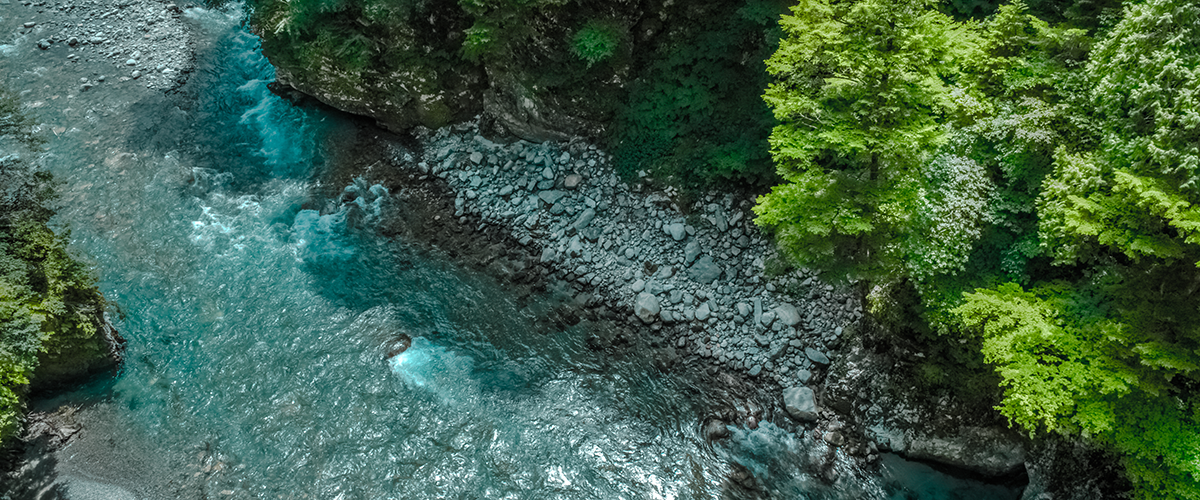We asked 3 Decolonizing Water Research Assistants to reflect and write about their time at the Anishinaabe Nibi (Water) Gathering 2018.
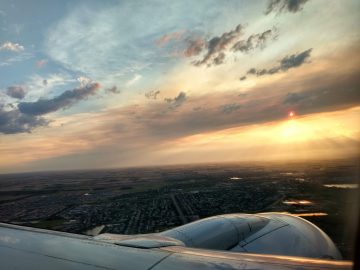
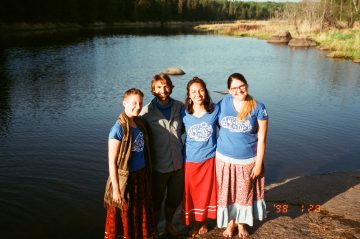
Jacquie Tourand
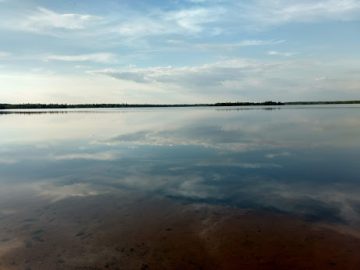 Driving from the Winnipeg Airport to the Gathering site was my first introduction to Manitoba. The landscape was so different from the West Coast; the trees were a different kind of green and there was no moisture in the air. There were no mountains to cradle you in their embrace and I felt so exposed. But then the skies lasted forever and it was its own breathtaking kind of beauty.
Driving from the Winnipeg Airport to the Gathering site was my first introduction to Manitoba. The landscape was so different from the West Coast; the trees were a different kind of green and there was no moisture in the air. There were no mountains to cradle you in their embrace and I felt so exposed. But then the skies lasted forever and it was its own breathtaking kind of beauty.
The day before the Gathering was to start I helped build the Teaching Lodge. Peter and his daughter directed the building efforts. Her own children reminded me of my nieces and nephews back home and made me think how our lives truly are built on the relationships we have with each other. Building the lodge was physical work and it was a very hot, dry day. Drinking the cold water that several ladies brought overwas a gift. My favourite part of the endeavour was when everyone came together to pull the tarp over the entire structure. It just felt so good to be part of something larger than myself. That we were all working towards a common goal.
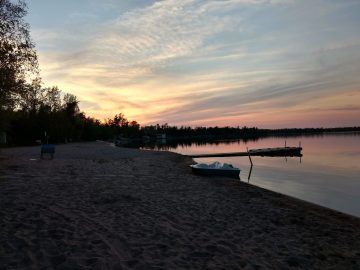
During the Gathering, there were multiple ceremonies. It was really emotional and powerful to listen to people share their stories. They aren’t mine to tell, but the lessons learned will stay with me. Especially during the woman’s circle; it was so important to hear from woman from all over share their accomplishments and perhaps more importantly their struggles so freely and so openly. I want to be as strong and as vulnerable as these women were and to be that for others.
Near the end of the Gathering, I went with a group of others to the petroforms nearby. I walked with an older woman from Manitoba and we talked about how incredible it was that we were here, the result of generations of people living lives we’ll never know. It really hit home looking at the petroforms, how what we do today will ripple out towards the future, beyond what we can truly understand or imagine. We shared stories about our lives and our families and shared an intense moment as we each spoke of the difficulties we’ve encountered. We hugged and cried together. In that instant I loved her. We’ve exchanged contact details and I plan on visiting her.
Up until the Gathering, I had never really considered the role that water has taken in my life. The Anishinaabe Nibi Water Gathering has truly challenged how I relate to water. From the tea I drink, to the showers I take, to the water that nourishes the trees, plants,and animals around me that I love so much, I have realized how much water has been there for me in my life. When I was a little girl, I was sexually assaulted at a pool and became afraid of being in water. But I found comfort in bathing and how water would wash away all the negativity, the shame, and the feelings that stuck to my skin and hair. Even when I was scared or angry with water, the water was there for me. She loved me even then.
For me, the Gathering was a time of listening, learning, and reflection. I am grateful for the experience and I have left with a renewed sense of hope. So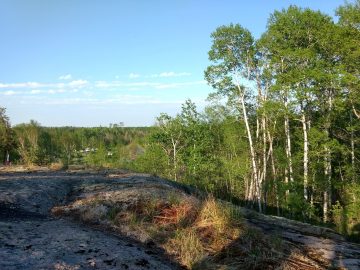 me of the takeaways that I’ve learned are: the importance of sharing knowledge, especially cultural knowledge and language; the importance of reaching out to others and sharing struggles together and of not being embarrassed or ashamed of having feelings; and most importantly, how much water takes care of us and our responsibility to take care of her in return.
me of the takeaways that I’ve learned are: the importance of sharing knowledge, especially cultural knowledge and language; the importance of reaching out to others and sharing struggles together and of not being embarrassed or ashamed of having feelings; and most importantly, how much water takes care of us and our responsibility to take care of her in return.
Myia Antone
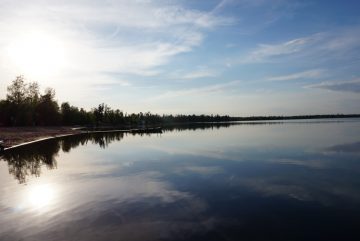 nilh ta ents Myia Antone kwi en sna. tina7 chan Sḵwx̱wú7mesh Stá7mes úxwumixw.
nilh ta ents Myia Antone kwi en sna. tina7 chan Sḵwx̱wú7mesh Stá7mes úxwumixw.
Coming home from the Anishinaabe Nibi Gathering 2018, I have so much to reflect on. My heart and spirit are full of the teachings I received and new friends I made. Visiting Manitoba for the first time, we spent 6 days on Treaty 3 lands and waters and after landing, I instantly felt a difference from being on the west coast. The land holds different stories, different memories.
The first day was spent with a smaller crowd, setting up and preparing for the gathering. Wearing our ceremonial skirts, we had a group of youth climbing ladders and tying poles together to help prepare the Midewiwin lodge. Following that, each day consisted of songs and teachings that honour the water. The gathering site was beautiful but a space takes its shape from the energy of the people who gather there. It was when everyone arrived that the space really became beautiful. We started everyday in a good way and met in ceremony. The lodge nurtured relationships and created a community.
One day, during a women’s support circle, a storm erupted and rain poured from the skies and thunder pounded through our bodies. Chaos erupted as everyone ran for cover and I bumped into an elder finding a safe home to place her tobacco offering for the thunderbirds. She reminded me to be grateful for blessings of the thunderbirds and the strength and power of Mother Earth. It had been very dry in Manitoba and everyone was relieved for the water. As we rushed back to our cabin to keep dry, I felt a bit homesick. The warm rain felt like a hug from my ancestors, reminding me of my west coast roots and that every living being on this Earth deserves water. We all need that water to dig our roots even deeper, grow taller and bloom every year.
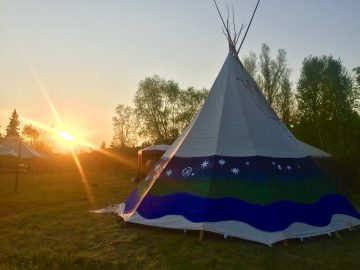
I am grateful for this moment in time, when I’ve been gifted opportunities to cross paths with individuals that speak to my heart and nourish my being. I’m grateful for spaces like this gathering that celebrate the water protectors and hold up community as places of resistance and resurgence. In the most gentle way, I felt the presence of my ancestors and the presence of the ancestors of those lands and waters join us in ceremony.
I left Manitoba wondering what my responsibility and accountability to bear witness these stories and how will my actions reflect the stories I heard. I came home with a nourished mind, body and spirit. I feel stronger to continue in the fight to protect my traditional lands and waters for my future children and grandchildren. I want t
o take a moment and raise my hands up with so much love and respect to all my relations involved in carving out such an important space and giving me the opportunity to take part in it.
I am constantly thinking about the words of elder Peter Atkinson, “water will never cease to flow, when we hold it up.” This speaks to our responsibility as water protectors to hold up water, as water is life. We are reminded that Creation is dynamic. It continues to live on, even after we do. But that is only possible if we protect her. This is so important because when you take care of Mother Earth, she takes care of you.
chen wa kwélulusnitúmi ti txwna7na.
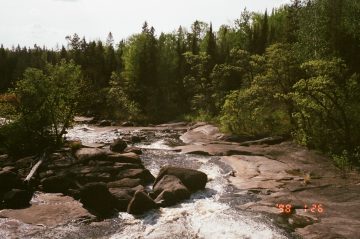
Adèle Therias
Anishinaabe Nibi Water Gathering: Witnessing Resilience
As a research assistant for the Decolonizing Water Project, I was fortunate to attend the 2018 Anishinaabe Nibi Gathering this May. Having had a decidedly urban and global upbringing, I was humbled to meet people and hear teachings grounded in meaningful relationships to the land and to each other. I was immersed in another culture, and I am grateful to have taken part in Anishinaabe ceremonies and learned some principles of Anishinaabe Law. Being a descendant of European settlers, I felt my ancestors lean in as I witnessed powerful Indigenous resilience to Canada’s colonial past and present. Considering that my research outside of Decolonizing Water focuses on community resilience, it was eye-opening to see examples of the powerful work that is happening in Indigenous communities. When we returned from the trip, I struggled with the sudden sensory overload and the change of pace in the city, but I have been working to bring my learning with me and apply it in my work as I move forward.
The gathering reminded me of a family reunion from my childhood: it was multi-generational, we shared good food and, while some people did not know each other, everyone belonged there. I was struck by the respect and priority given to the elders, to whom we listened attentively and who were served their meals first. During ceremony, several babies and children would often be crawling and walking around, endlessly curious and encouraged to explore. It was evident from the first moment that each person had a responsibility in shaping the gathering, whether building the ceremonial lodge, watching the fire overnight, leading workshops or serving food. The men and the women were celebrated for their roles, and I was reminded of how positive intention and shared responsibility can create a healthy community, whether a family or a village.
Anishinaabe Nibi gathered people from different Indigenous and non-Indigenous communities, at different stages of learning about our identities and cultures. We shared space, words, and sacred experiences that helped me better understand how to be a respectful ally. I learned about the strength that can come from spiritualism, the belonging that is cultivated through ceremony, and the fight that is happening every time someone reconnects with their language. I learned about forms of resurgence that surprised me and left me in awe: Kacey Adams taught us to create bowls from clay harvested from the riverbed and how to conduct a firing ceremony. She explained that the clay tradition is one that was lost among previous generations but it has been traced and recreated with the help of archaeological records and experimentation. I learned about the power of resurgence that is grounded in love, with a deep respect for the land and water.
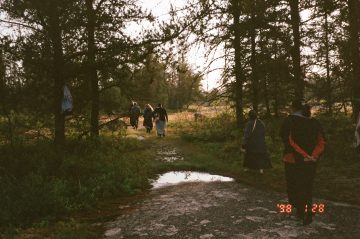
The gathering brought me new perspectives on knowledge. Fred explained that knowledge is within and learning is just gaining insight into what we already know. This understanding emphasizes the importance of those who came before in shaping what we experience today, and the process of sharing knowledge becomes just as important as the knowledge itself. As a result, I have begun reaching back to hear my own ancestors’ stories to better understand the history and legacy of my family. I also learned about the knowledge that is carried in each water droplet, and in the water that makes up the majority of our bodies. On the last day of the gathering, Laura taught the youth a song to carry with us into the future. She emphasized the importance of truly knowing things, rather than writing them down and forgetting them. Well, I will never forget the experience of sitting around her and repeating this song. Repeating it until the words were embedded into our minds. Repeating it until our hearts matched the beat of the drum.
